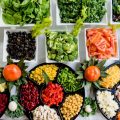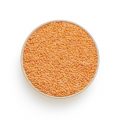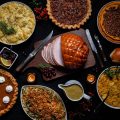I think many of you may know of a great series on eating disorders in which she tells her individual story of becoming and recovering from an eating disorder with outstanding clear-sightedness and amazing openness. If you have not read it, please do, it is so insightful!
Recently, she wrote a post about bingeing, and I read the whole post and all the comments with bated breath, so much did they excite me, and they have inspired me to some thoughts about a topic I have been wondering a lot in the past. I will share these thoughts in a hypothetical form today, because this is what they are – just hypotheses so far. And of course, I would love to learn your thoughts about it!
The thing I have been thinking about was whether it was appropriate to learn how to eat everything again in ED recovery, or to stick to a special diet later on. There seems to be a lot of controversy on this topic, and for sure it is a very sensible one because the health of so many people depends on it. And while there seem to be a lot of sensible arguments on both sides, I never had an idea what was the crucial factor in deciding which approach is the right one. (I also do not believe that there is something like the right answer, but rather it depends on an individual person’s specific eating disorder history which way is more appropriate.)
Now, however, I have an idea, and I got that idea from reading her post. But please regard that it is only an idea, a hypothesis, and I do not have evidence for it. But from my point of view, it makes sense, though – against the backdrop of what I have learned from other people’s and my own experiences with an eating disorder.
Basically, that idea has to do with the way you have eaten during your illness and maybe also before and later on. It has also to do with body-mind connection.
In the psychological theory of addiction, there is often differentiated between addictions which are tied to a certain substance, and addictions which are not. Examples of the former are all kinds of drug addiction and alcoholism, while examples of the latter are gambling addiction, working addiction, shopping addiction, or pathological co-dependence. Interestingly, eating disorders – anorexia as well as bulimia – are included in the latter category, with the argument that they are rather about an activity (eating or not eating) than a substance (food).
Is that true? I really wonder. I also wonder if this categorization of addictions makes sense at all. For example, you could argue that alcoholism is as much about an activity – drinking or not drinking – as all other addictions that are considered as being independent from substances are.
In the past years, I have learned enough about brain physiology to know that all addictions have a psychological and a physiological side: Psychologically, an addiction can be understood as a very powerful pattern of unhealthy thoughts, feelings, and behaviors. Physiologically, it manifests in the brain as certain neurotransmitter reactions as well as altered brain structures from long-time conditioning of addictive behaviors.
So, if you desperately want to keep that categorization, you should put eating disorders at least at the border between the two.
However, considering eating disorders as being independent from an addictive substance (food, or rather, certain foods, as we shall see later) has massive consequences for the way eating disorders are treated – namely, as mainly psychological issues. They are not. They are, to the same amount at least, physiological issues. But the body seems to be neglected in treatment as it was during the development of the illness.
I have mentioned the concept of long-term conditions above, and I really believe that you can think of an addiction as the result of a very detrimental and very profound learning history of unhealthy cognitive, emotional, and behavioral patterns. When you develop an eating disorder, this process takes place over a time of several years usually. During this time, certain thoughts, feelings, and behaviors are systematically trained and rewarded, while others are repelled and punished – this is the learning history part. Moreover, the patterns and the processes associated with them interact with each other, enhance and nourish each other, and thus stabilize at a highly destructive and dysfunctional equilibrium (the manifest syndrome of an eating disorder) – this is the systemic part.
And this is the reason why recovery is so difficult and takes so long: Recovery means to un-learn the eating disorder, and this is very hard work because the spectrum of ED-related responses is the only one you have at hand then. It is like a highway you drive along with high speed, and it is very difficult to slow down and get off it if you do not know how to brake.
What does all of this have to do with post on bingeing? Well, I believe that there is another thing that plays a role in an individual’s eating disorder history, and this is whether a person has developed an addiction to sugar or not. I have said before that I believe in the addictive potential of sugar, and there has been some discussion on whether something like sugar addiction exists or not. I believe it does. Let us stay with this thought for a moment.
I think that the development of an addiction affords both a disposition for it, and frequent exposition to what you become addicted to for a certain amount of time. I also think that the disposition is the genetically part – and therefore inheritable – while the exposition is the learning part. From my own experience, I know that I have a disposition to become a sugar addict, namely very instable blood sugar levels. This is something I have inherited from my mom (who never had an eating disorder, by the way, but) who suffers from reactive hypoglycemia to a degree that she will never leave the house without taking something to eat with her, in case her blood sugar level suddenly drops. This happens within a few minutes, and if she has nothing to eat then, she will end up fainting. I have the same thing, and high perfectionism paired with lack of self-confidence (as a child and adolescent) on top of it, which makes the perfect physiological and psychological condition to develop an eating disorder.
Now comes the crucial part: While I have always had a very sweet tooth – I loved cereal, sweetened yoghurt, and ice cream as a child, and could easily finish off a big bowl of candy within a single afternoon – I still ate a somewhat balanced diet as a child, thanks to my mom who always cooked fresh vegetables with every meal, and my dad who loves to fish and provided us with freshly caught fish to have several times a week. But when I started to watch my eating and restricting my intake, I gradually removed all protein and fat from my diet to save calories, and ate more and more carbs. Just carbs. They were what I liked the best, so why waste calories on things I did not like as much?
I ended up eating a diet that consisted of 80 or more % carbs, and I did that for about 10 years or more. Funny enough, while doing so, I still thought it was somewhat healthy what I did – I ate low-fat, low protein, and high carb, as officially recommended, I ate an almost vegetarian diet with just some milk (skimmed, of course), lots of fruit, and grains (rolls, bread, rice, pasta). Okay, and I also ate a lot of candy. On some days, I lived on nothing but a few bags of candy a day.
Today, I know that I ate almost nothing but sugar in those days. Dairy products contain quite a lot of sugar – in skimmed milk, which was the only thing I consumed apart from fat-free yoghurt, 60 % of the calories are from milk sugar – fruit contain a lot of sugar, grains (I did not eat whole grains, just the white, starchy stuff) are all carbohydrate, and candy … Well, you can imagine. The few tomato or cucumber slices (no butter!) I put on my breakfast roll did not save me. I stuck to this diet for years, plus restricting my calorie intake, and it may not surprise you that I was hungry all the time. I almost lost my mind from hunger. And sometimes, when I could not bear it anymore, I ate more than I wanted, and ended up eating even more sugar. My trigger foods have always been combinations of simple carbs and fat, or pure sugar, and they still are. I have trained my poor brain to be a sucker for sugar, and now I am like a recovered alcoholic – I know that I will relapse with 99 % chance if I eat more than tiniest amounts of sugar and white flour, especially on an empty stomach, or if I have a serving of white bread, pasta, or rice, especially when the same meal also contains fat and nothing more. Eating these foods immediately elicits the compelling urge to eat more, I experience a boost of anxiety, and fall back in my obsessions of restricting and planning everything. This is why, after so many years of failing with the attempt to “eat everything in moderation”, I only got better when I changed to a carb-reduced and very low sugar diet, and I get worse again if I do not stick to it conscientiously.
What I learned from her post and the comments on it was that people with an eating disorder go for different strategies. While I became a fat-phobic, did not care for protein, and thus focused on almost merely carbs, others rather became fat-phobics and carb-phobics and thus focused on protein like chicken and lots of steamed vegetables. I believe that people who did the latter did not develop a carbohydrate sensitivity during their eating disorder, what makes it appropriate for them to learn to eat a balanced diet again that also contains a sensible amount of carbohydrates. Others who did like I did and ended up as sugar addicts will have a hard time to recover on the eat-everything-again approach, because the consumption of higher amounts of carbohydrates will constantly trigger them and make them relapse into the eating disorder very easily – and this has nothing to do with will power! It is just your body’s memory of addiction.
This seems crucial to me because what is the appropriate strategy for one group of eating disordered people is the totally wrong strategy for the other group, and vice versa – depending on how your diet looked liked during your illness, and whether you developed a sugar addiction or not.
So, here are my hypotheses:
If you recover from an eating disorder, it is crucial to start eating a nutritious and balanced diet again. You will not be able to recover as long as you go on systematically depriving your body of essential nutrients and energy from food.
If you have never abused sugar, it will be a good thing to reintroduce all different groups of food in balanced proportions.
If you have developed a real addiction to certain foods (most likely sugar, I think) during your illness, it will be a good thing to stay away from your trigger foods later on, at least until your health has stabilized again, but maybe for all of your life. Especially in the case of carb-sensitivity, eating a carb-reduced (but not low-carb) diet higher in protein and fat may help you to feel better.
I do not want to say that sugar and simple carbs are evil and should be avoided under all circumstances. We all know that they taste good and lift your spirits. But I see them rather as a drug like alcohol which you may want to enjoy in small amounts every now and then – there is nothing wrong with that – but you should not consume them in larger quantities and too often.
I also do not want to say that carbs are bad in general. They are not, and the body needs them to fuel the brain and build serotonin, a neurotransmitter that provides feeling well and relaxed. Lack of serotonin may make you relapse (by making you feel depressed and low) as quickly as the carb-overload does (by sending you on the blood sugar roller coaster). So I think it is very important to eat some carbs (and the right ones – complex carbs from vegetables, fruit, and some whole grains and legumes), while accounting for getting in enough protein, fat, and micronutrients as well.
What do you think? Can you relate to my experiences? Do you agree with the hypotheses I have written above?









